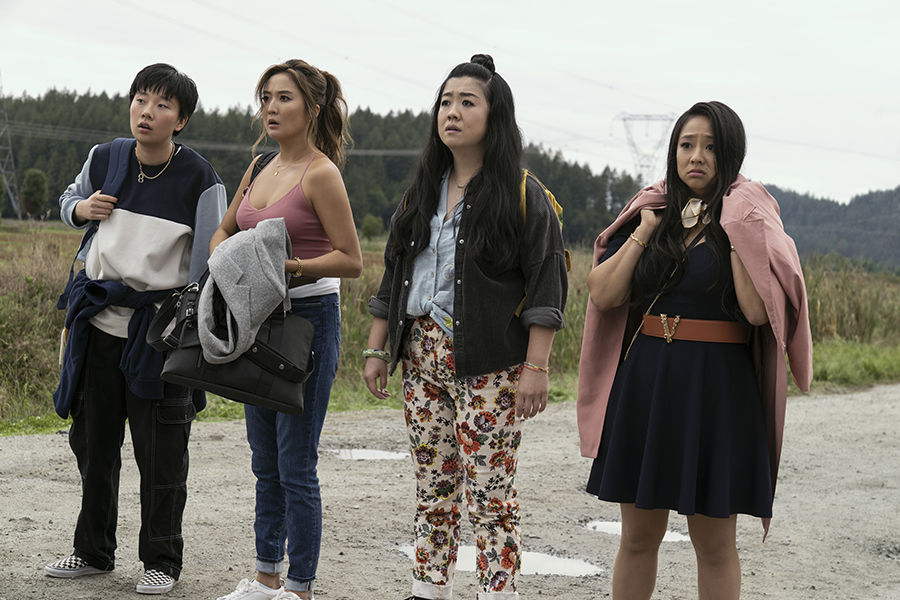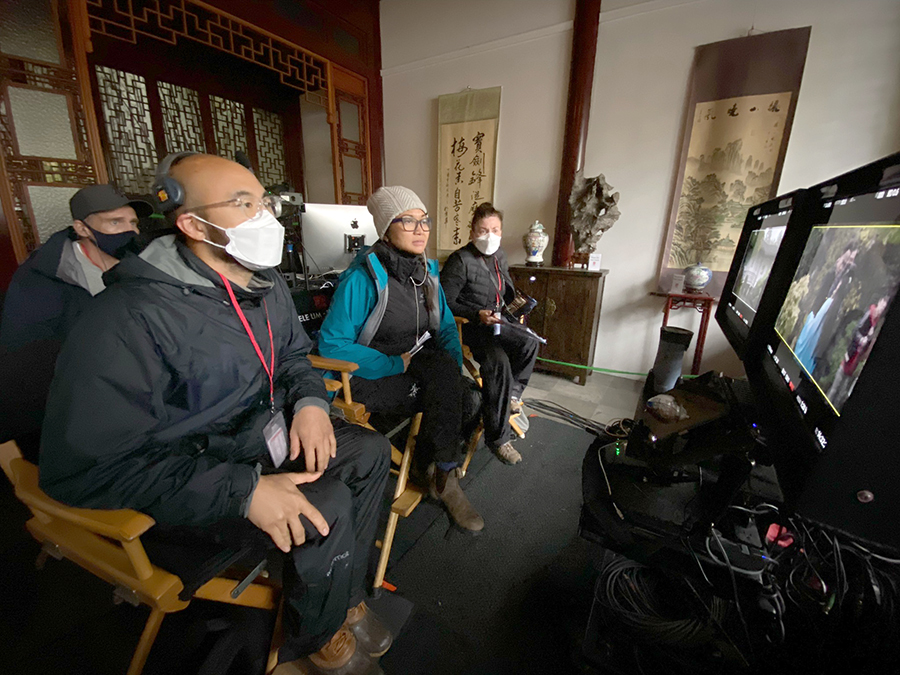By Kai Curry
NORTHWEST ASIAN WEEKLY
I want to talk about what “Joy Ride” the movie IS. It’s not perfect, yet it’s a lot of what we need on the screen for Asians. It’s the naughty brainchild of Asian American women: director/writer/producer Adele Lim and writers/producers Cherry Chevapravatdumrong and Teresa Hsiao. It’s a story of a group of friends who travel through China, ostensibly to seal a business deal for one of them—Audrey (Ashley Park)—but also to hang out and hook up.
Along the way, Audrey, who is adopted with white parents, is persuaded to look for her birth mother. She doesn’t want to be invested in this search for identity, and is doing it just for an angle for her job—but is increasingly invested.
Let’s meet the rabble rousers.
There’s Lolo (Sherry Cola), the “body positive” starving artist who wants to “start the conversation” about sex with, among other things, a rendition of a childhood playground entirely transformed into penises and vaginas. No need for euphemisms. Let’s stay true to the movie, which is frank as hell, and good for it—we need that in this country where sex and violence are usually together and the latter is more popular at the box office. You go, Lolo.
There’s Kat (Stephanie Hsu), Audrey’s former college roommate, now a star in Chinese period soaps. She has a riotous past, yet is engaged to a “Bible thumper” of a Chinese man, Clarence (Desmond Chiang), who puts Jesus “between” them (envision a physical space that Jesus’s body could fit into), so as to not give into temptation until marriage. Kat has not really turned a new leaf, though, and is hiding her true self (in more ways than one!). You go, Kat.
There’s Deadeye (Sabrina Wu), aptly named (a running joke), whose pronoun is “they” and who loves K-pop because “it loves me back” and “it’s the movement we [Asians] created.” Deadeye is awkward, sweet, and the most centered person in the story, probably. You go, Deadeye.
Then there’s Audrey, a lawyer from ?Seattle? (there are several PNW references, including Snohomish County, of all places, and SeaTac airport—woohoo!). We have no real proof Audrey is a lawyer besides being told so. Her powers of persuasion are severely lacking. She does not once talk herself out of anything, except at the end when she gets her friends back after behaving badly and blaming everyone else for the problems she insists she doesn’t have. I think this is Ashley Park’s best role so far, but she wasn’t my favorite in the movie. Her character was just the centerpiece that brought all the friends into the same story, imo, and helped explore the themes.
 It’s a raunchy ride. If you are squeamish about sex, get ready for your own ride. It’s also an intelligent promotion of sexual freedom and exploration for women and LGBTQs. It might not look like that at times, lol, with all the banging body parts flying about (i.e. a pivotal sequence involving a lot of drugs and a very horny basketball team), but having all that on screen is a big deal; and if we are wanting to banish the demure Asian female stereotype—it’s taking care of that as well.
It’s a raunchy ride. If you are squeamish about sex, get ready for your own ride. It’s also an intelligent promotion of sexual freedom and exploration for women and LGBTQs. It might not look like that at times, lol, with all the banging body parts flying about (i.e. a pivotal sequence involving a lot of drugs and a very horny basketball team), but having all that on screen is a big deal; and if we are wanting to banish the demure Asian female stereotype—it’s taking care of that as well.
“Oftentimes female sexuality is played for sexiness whereas male sexuality, male nudity, is played for laughs,” Hsiao remarked at a press conference. “We kind of did the opposite here.” Good for everyone.
“Joy Ride” is about community.
“We wanted a movie that we could bring all our friends to and just laugh our asses off,” said Lim at a press conference. When asked about representation, Hsiao joked, “Every morning, I wake up and I’m like, ‘Oh my God, I’m Asian!’…we just wanted to write about our friends, and some of our friends happen to be Asian.” No disrespect was meant—but rather that Hollywood is rounding a corner, finally, where regular stories can be told by all.
“We were basically just trying to make each other laugh,” added Chevapravatdumrong.
“Joy Ride” includes casually, not like cameos, a whole slew of the Asian acting community (Chris Pang, Ronnie Chieng, Lori Tan Chinn, to name a few). There is a wonderful sense of family, or the community within the community, you could say. You should have heard the catcalls from the audience when Daniel Dae Kim appeared on the screen. Also, when did he get old? *boo. “Joy Ride” as a movie feels like when Audrey is in China, surrounded by Asians for the first time in her life, and says, to the effect of, “If I had grown up like this, I would not have always been ‘the Asian’ [in any scenario]. I would have been ‘the lawyer’ or ‘the doctor’”—whatever she chose to identify herself as.
It’s not that simple, but you get the idea, and it’s an important one. “Joy Ride” understands, intimately, the concerns of the Asian community, the stereotypes inflicted and inflicted upon, and the condition of problematic identity. What are we? Are we the parents that raised us? Then Audrey is white. Are we our birth parents, even if we have never seen them? Then Audrey is whatever her birth mother is/was (presumed to be Chinese). Then there’s identity within identity. What kind of Chinese? Chinese enough? Not Chinese enough? Is Audrey, in fact, racist against Chinese people (she obsesses about crime in China, wants to sit with a white person on the train, and has never dated an Asian man. (Sorry, but a one-night stand with a gorgeous Aussie Asian basketball player does not check that box all the way yet, hon. He’s not from the Motherland!)

The friends in “Joy Ride” find themselves in a pickle while in China. From left: Sabrina Wu, Ashley Park, Sherry Cola, Stephanie Hsu. (Photo by Ed Araquel and courtesy of Lionsgate)
The ultimate questions in “Joy Ride” are why do we have to be any of these? How can we be all of these? The message is “Just Be Yourself”—but how do we know who that is? Our “self” is comprised of so many parts, and that includes all of the parts that we reject. All of this is told with humor, to great effect, such as when Audrey is insisting she’s not white by listing her favorite music and it’s all typical “white” music (sorry Maroon 5, they finally agree on Cardi B).
“Joy Ride” is about “chosen family,” as the stars discussed at the same press conference.
“You can’t get through life without special people next to you,” Cola said, to which Park wisely added, in order to choose your family, “you need to know who you are.” Being in Audrey’s shoes, Park continued, “really opened up my mind so I get to say who I want to be in my chosen family.”
It’s touching when, at rock’s bottom, looking for her “real” family, Audrey calls her adoptive white parent, dad. Chosen family is what you decide. Chosen family loves you and you love them.
Kai can be reached at info@nwasianweekly.com.


